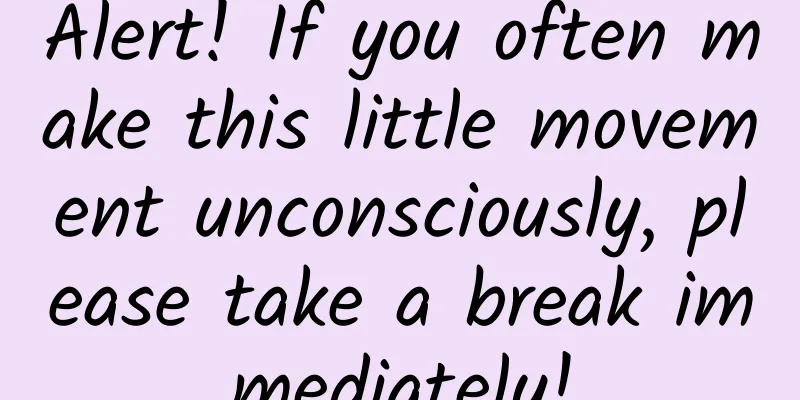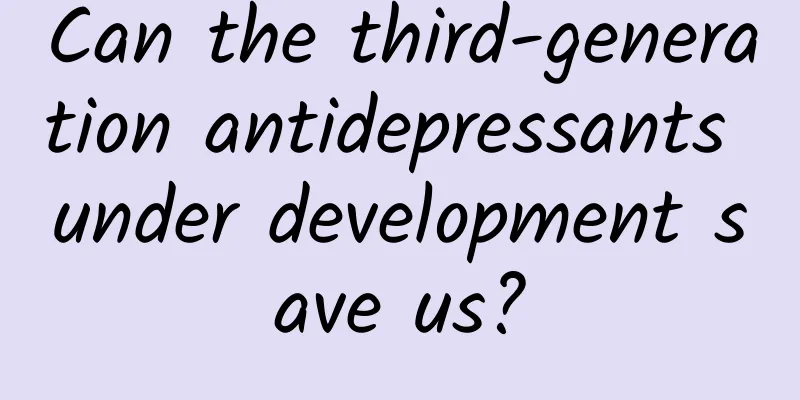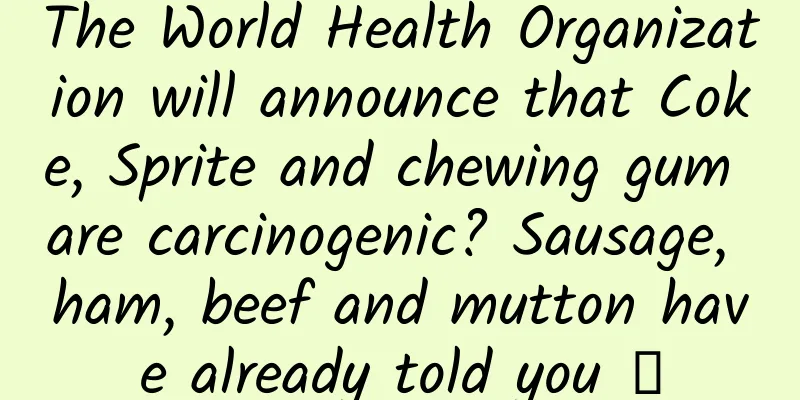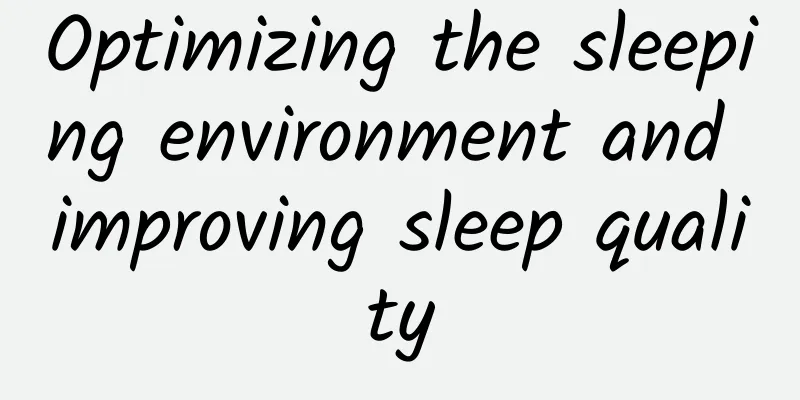Alert! If you often make this little movement unconsciously, please take a break immediately!

|
Have you ever noticed that when you are busy, overwhelmed, anxious and tired, your body seems to have a series of reactions, such as your muscles becoming tense, your shoulders and neck becoming stiff, your brows often furrowed, or you feel a headache, become restless, etc. Even more interesting is, have you ever had a moment when you found yourself clenching your teeth, clenching them so tightly that your jaw and masseter muscles began to ache, but you were not aware that you were doing this at the time? Why do we unconsciously clench our teeth when we feel anxious and stressed, and what effects does this habit have on us? Copyright images in the gallery. Reprinting and using them may lead to copyright disputes. Do you clench your teeth unconsciously? Unconscious clenching of teeth has a professional name in psychology: bruxism, which is usually manifested by people clenching or rubbing their teeth unconsciously and repeatedly. It is divided into two main types: one occurs during sleep, called sleep bruxism; the other occurs during wakefulness, called awake bruxism. In the common sense of most of us, sleep bruxism may seem more familiar. Many people may have been woken up by the grinding of their roommates or partners, which is second only to snoring when sleeping. Awake bruxism refers to a type of chewing muscle activity during wakefulness, which is mainly characterized by repeated or continuous tooth contact and pushing or force of the lower jaw. You can feel that when you are relaxed, your upper and lower teeth generally do not bite together, but leave a certain gap. However, when you are nervous or lost in thought, you may unconsciously let your teeth touch or rub against each other lightly, or even feel that your jaw is trying to "force", as if you are trying to bite something, even though you are not actually biting anything. Many people may think of the term "grinding your teeth", which seems to be similar to conscious bruxism, but there are actually some subtle differences between the two. In daily life, "grinding your teeth" is usually used to express an attitude of perseverance or restraint, or a performance of exerting all your strength. It is more like eating, a more purposeful or obvious action. Conscious bruxism is another habitual and unconscious reaction that anxiety and stress bring to the body silently. You may not pay special attention to yourself grinding your teeth unless someone reminds you or you start to feel some soreness in your jaw. The habit of teeth grinding is actually very common. A recent meta-analysis study published in the Journal of Clinical Medicine in July 2024 showed that the prevalence of sleep bruxism is 21% worldwide, and the prevalence of awake bruxism is as high as 23%, which means that more than a quarter of people have the habit of unconsciously clenching their teeth. A study published in 2016 found that bruxism is more common among college students, with the prevalence of sleep and awake bruxism reaching 31.8% and 37.9% respectively. Long-term bruxism, especially awake bruxism, may lead to loose and worn teeth, periodontal problems, hypertrophy of facial muscles, and decreased ability to open the mouth after waking up in the morning. Therefore, unconscious clenching of teeth is not a good habit! Copyright images in the gallery. Reprinting and using them may lead to copyright disputes. Unconsciously clenching your teeth means "I'm so tired" Although the cause of bruxism is not yet fully understood, more and more researchers believe that bruxism, especially conscious bruxism, may be one of the somatic symptoms of people's negative mental health status. A paper published in the academic journal Frontiers in Neurology conducted a study on this. The researchers recruited 68 volunteers, 29 of whom met the clinical diagnostic criteria for conscious bruxism and were divided into the case group, while the remaining 39 were control group volunteers who had no bruxism habits. The researchers conducted a series of psychological assessments on the two groups of volunteers, including the State-Trait Anxiety Inventory (STAI) and the Brief Symptom Inventory-18 (BIS-18). The results showed that compared with the control group, the case group showed significantly higher levels of anxiety, depression and somatization symptoms (i.e. some physical discomfort symptoms without clear causes, such as headaches, muscle aches and dizziness, which are generally considered to be externalized manifestations of psychological distress). At the same time, the results of the STAI assessment also showed that the case group not only showed a higher state of anxiety, but also had stronger anxiety traits, which refers to an individual's long-term tendency to be anxious, which is considered to be a relatively stable personality trait. Image source: Reference 4 Another paper published in International Biomedical Research found that about 81% of patients with conscious bruxism were in a state of high stress, and the remaining 19% were in an average state of stress, which means that no patients with conscious bruxism were in a state of low stress. At the same time, about 38% of patients showed a certain degree of alexithymia, which is a personality trait that manifests as an individual's obstacles in emotional expression and recognition, making it difficult for people to accurately identify and describe their own or others' emotions. From these psychological studies, we can find that the habit of unconsciously clenching teeth may indicate that we may be in a state of anxiety, depression and high pressure recently, which is a warning sign of mental fatigue. At the same time, it also reflects that we may have a certain degree of anxious and lyrical personality traits. We have always been more prone to anxiety and are not able to keenly perceive our negative emotions. We tend to keep our feelings in our hearts instead of confiding them to others, so we often "grit our teeth and persevere" alone. How to change the habit of unconscious teeth clenching? As biologist Darwin mentioned in his book "The Expression of the Emotions in Man and Animals": "Gnawing teeth and emitting sharp screams can bring relief from extreme pain." Gritting your teeth is actually a way for us to vent emotions and stress. This is because the chewing action can reduce the release of cortisol and the production of salivary chromogranin in the body. These two substances are markers of stress and tension, thereby relieving negative emotions and stress. However, clenching teeth can only temporarily release emotions, and it will not help mental health in the long run. It will also cause a series of oral problems such as loose teeth and wear. For patients with more serious bruxism, doctors will recommend wearing braces to reduce the wear on teeth, but more importantly, they need to be aware of this bad habit and adopt a series of methods to reduce stress and manage emotions. First, we can objectively assess whether we have the habit of unconsciously clenching our teeth through some self-evaluation questions about bruxism, such as: Question 1: “Are you aware that you clench your teeth when you are awake?” Question 2: "How would you currently rate your jaw muscle stiffness or tension?" Question 3: "In the past 6 months, what was the greatest amount of tightness or stiffness in your jaw muscles that you felt?" Question 4: "Over the past 6 months, how much tightness or stiffness did you feel in your jaw muscles on average?" For the last three questions, you can use a score of 0 to 10, where 0 means "not tense or stiff at all" and 10 means "very tense or stiff". If the score is ≥ 4 points, it means that you may have the habit of unconsciously clenching your teeth. It is recommended that you pay more attention to the feeling of your jaw when you are nervous and under high pressure. Secondly, when we find ourselves having such a habit, we can use these eight words to remind ourselves: "Lips close, teeth separate", write them on stickers, and stick them on places where we often feel stress, such as at our workstations or on computer screens. In addition, the most important thing is to learn more benign methods of stress relief and relaxation. Whenever you feel nervous and anxious, use these methods to replace the habit of gritting your teeth. For example, progressive muscle relaxation technique, this technique can effectively relieve tension and stress by tightening each group of muscles from the feet to the head and then slowly relaxing them. You can also try some activities that you like and that are easy to get positive feedback, such as a set of yoga stretches, gentle exercise such as walking or jogging, creative activities such as coloring or crafts, taking a hot bath, etc. These methods can better relieve stress, improve psychological resilience, and have certain benefits for physical health, both immediately and in the long run. References [1] Zieliński, G., Pająk, A., & Wójcicki, M. (2024). Global Prevalence of Sleep Bruxism and Awake Bruxism in Pediatric and Adult Populations: A Systematic Review and Meta-Analysis. Journal of Clinical Medicine, 13(14), 4259. [2]Cavallo,P.,Carpinelli,L.,&Savarese,G.(2016).Perceivedstressandbruxisminuniversitystudents. BMCresearchnotes, 9,1-6. [3]Demjaha, G., Kapusevska, B., & Pejkovska-Shahpaska, B. (2019). Bruxismunconsciousoralhabitineverydaylife. OpenaccessMacedonianjournalofmedicalsciences, 7(5),876. [4] Soto-Goñi, [5]Przystańska,A.,Jasielska,A.,Ziarko,M.,Pobudek-Radzikowska,M.,Maciejewska-Szaniec,Z.,Prylińska-Czyżewska,A.,...&Czajka-Jakubowska,A.(2019).Psychosocialpredictorsofbruxism. BioMedresearchinternational, 2019(1),2069716. [6] Goldstein, RE, & Clark, WA (2017). The clinical management of awakening Bruxism. The Journal of the American Dental Association, 148 (6), 387-391. Planning and production Author: ACC Psychology Popular Science Reviewer: Fan Chunlei, Associate Researcher, Institute of Psychology, Chinese Academy of Sciences |
<<: Someone got poisoned after eating toads! Don't be greedy for these things →
>>: Why is it necessary to have a comprehensive oral examination before pregnancy?
Recommend
What is the best way to catch up on sleep after staying up late? Is 8 hours of sleep enough? Huaxi experts teach you how to sleep well
How many people are like me? I just wanted to hav...
Tongling City successfully completed the on-site monitoring work of the provincial iodine deficiency disease monitoring point
Tongling City successfully completed the on-site ...
How long does it take to achieve breast augmentation with autologous fat
In fact, using autologous fat for breast augmenta...
Why do pregnant women often hold their breath?
Pregnant women often feel short of breath, which ...
Don't sleep like this anymore! Your brain is more likely to have problems and your body will age prematurely...
In real life, many people have two criteria for j...
Is medical abortion harmful when pregnant?
Nowadays, many people choose medical abortion whe...
How can the fetus absorb nutrients?
There are two situations when people are pregnant...
What are some folk teas for bacterial vaginosis?
Bacterial vaginitis is a common disease of the fe...
What are the consequences of reverse connection of the positive and negative poles of the car battery? How to repair the reverse connection of the positive and negative poles of the battery?
Car batteries are a type of storage battery that ...
Why do I have itchy little bumps on the inside of my labia?
Now with the liberalization of sexual concepts, m...
What should I pay attention to when I have breast fibroids?
Breast fibroma is a common disease in women. Brea...
What are the methods for testing anovulation infertility?
When women have abnormal physical conditions, the...
Can pregnant women eat agar-agar?
Agar agar is something that many people like to e...
Which sanitary napkin is good? Authoritative experts teach you how to choose!
As we all know, women will use the bathroom durin...
What are the disadvantages of women not having sex for a long time?
Sexual life is a very important activity for men ...









